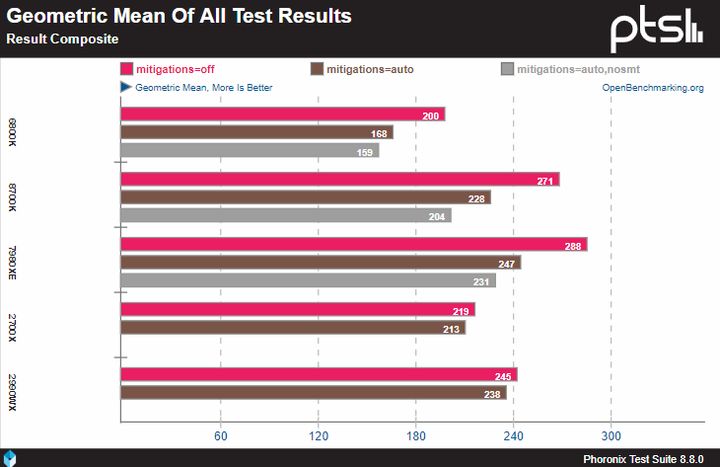Intel CPU Performance Drops After Fixing MDS Vulnerability
Phoronix editors tested the performance of processors after installing updates to fix security vulnerabilities detected so far, including the recently released MDS exploits. The results are not satisfactory.

IN A NUTSHELL:
- After fixing the security vulnerabilities, Intel's CPU performance decreased by 16%;
- Disabling Hyper-Threading brings even worse results, cutting CPU efficiency by half.
In mid-May we reported the detection of new security vulnerabilities in Intel processors: Zombieland, Fallout and RIDL, known collectively as MDS (from Microarchitectural Data Sampling). The exploits enabled third parties to steal data from the processor buffer and applied to all the company's chipsets produced after 2008. One of the possible solutions to the problem was to turn off the Hyper-Threading function, which meant a drastic drop in performance. Fortunately, the company released an update quite quickly, but it turns out that installing it also has its price. Phoronix editors report that CPU performance has decreased by an average of 16% after eliminating the vulnerabilities.
The situation is even worse when we decide to turn off Hyper-Threading, in which case for some tasks, processors do about 50% worse. For testing purposes, AMD units were also looked at, which lose around 3% of their performance after the elimination of the older Spectre exploit.

What's the conclusion? First of all, fixing security vulnerabilities involves a measurable cost in CPU efficiency. While AMD units perform almost the same as before the disclosure of the exploits (although the difference of 3% is of course also worth noting), unfortunately, the same cannot be said of competing processors. Since the first weaknesses were detected, Core-series CPU performance has already decreased by 16% and this should be taken into account when analyzing the old benchmarks. Security itself is also a problem - Intel's designs are riddled with vulnerabilities, and the number of reports of malicious exploits is really alarming.
- Cyberpunk 2077 looks even better with FSR 4 on older AMD graphics cards
- Intel and Apple together again? There are rumors about talks, and Tim Cook „would like to see Intel return”
- A critical security flaw in Unity Engine was discovered after 8 years. It puts players at risk, and now all games need an urgent patch
0
Latest News
- End of remote work and 60 hours a week. Demo of Naughty Dog's new game was born amid a crunch atmosphere
- She's the new Lara Croft, but she still lives in fear. Trauma after Perfect Dark changed the actress' approach to the industry
- „A lot has become lost in translation.” Swen Vincke suggests that the scandal surrounding Divinity is a big misunderstanding
- Stuck in development limbo for years, ARK 2 is now planned for 2028
- Few people know about it, but it's an RPG mixing Dark Souls and NieR that has received excellent reviews on Steam, and its first DLC will be released soon

